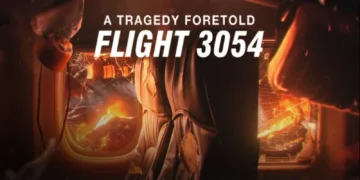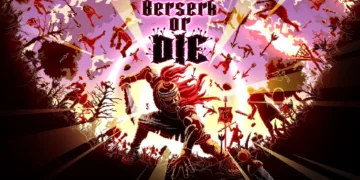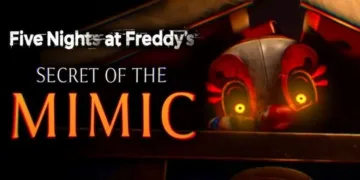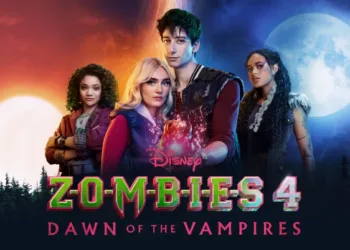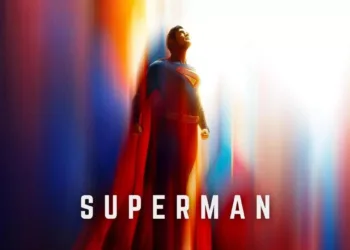Magic Hour (2025) unfolds as an intimate drama laced with surreal undercurrents, a film that both whispers and shouts its truths. Conceived and helmed by Katie Aselton—with Mark Duplass as co‑writer—this is a work born of close collaboration, yet transmuted into something uncanny and untethered.
At its heart lies Erin and Charlie, a married pair who decamp to an isolated Joshua Tree retreat after an unspecified calamity. Their shared history flickers into view through archived home‑movie footage, all golden light and soft laughter. Then, barely twenty minutes in, the story fractures: Charlie’s presence shifts from flesh to apparition, an early twist that reorients our gaze. This choice, daring in its economy, forces us to question every look and gesture that follows.
The film moves within a single, desolate house—its walls an echo chamber for grief. Aselton’s direction is unflinching and tactile, her camera lingering on tremors of emotion beneath the banal routines of breakfast and sunset. The scoring is sparse—just enough to make the quiet hum of desert wind feel like a heartbeat.
By revealing its structural secret so swiftly, Magic Hour offers both clarity and vertigo, inviting us to inhabit Erin’s fracture and, in those liminal moments of light and dust, to wonder what is real and what she has conjured.
Desert Reveries and Structural Fractures
From the outset, Magic Hour casts its spell through found home‑video footage—ghostly pop‑corn kernels of memory flickering in sepia. We see Erin and Charlie at their most alive: a ferris‑wheel ride, laughter echoing over creaking metal. This archival prologue grounds us in an intimacy that feels both fragile and eternal. When Brad Garrett’s character materializes with keys to a sun‑bleached Joshua Tree house, it’s as if someone has handed Erin the bait for a philosophical trap: confront the void, or flee its glare.
Barely twenty minutes in, the film detonates its central illusion. Charlie, once corporeal in our minds, dissipates into a spectral presence. Why now? Because grief, as the film suggests, is not a slow burn but a sudden rupture in the narrative of self. By rupturing the timeline early, Aselton invites us to ponder: if our stories can be rewritten mid‑sentence, what anchors us to reality?
Structurally, the drama unfolds in three uneasy movements. Act I seduces us with warmth and then fractures that warmth with revelation. Act II plunges Erin into an emotional maelstrom—her grief swings like Nietzsche’s eternal return, looping visions of Charlie with jarring interludes (a surreal drag‑queen serenade, a massage teetering on erotic ambiguity). Finally, in Act III, Erin negotiates a truce with loss: acceptance as both liberation and exile.
Pacing becomes a philosophical question. Dialogue‑heavy stretches feel like labyrinthine monologues on mortality; montages of desert blossoms bloom and decay in extended languor. Surreal cross‑cuts—Charlie morphing in and out of frame—propel us forward, yet at times the film drifts into padded stillness: lingering close‑ups of petals, hermetic silence. Then, just when the rhythm threatens to stall, a go‑kart race snaps the tension like Kierkegaard’s leap of faith—sudden, chaotic, and breathless.
In this dance of tempo and rupture, Magic Hour asks: are we merely treading water in the desert of our minds, or can we learn to swim toward some dim, half‑remembered shore?
Echoes of Presence: Souls in Solitude
Erin (Katie Aselton). Aselton’s Erin is a vessel of paradox: fragile yet unbreakable, anchored in domestic familiarity even as she drifts through emotional storms. One moment, her lips curve in wistful nostalgia—an archival laugh from cell‑phone footage—and the next, her cheeks burn with unrestrained anguish. Grief becomes a tactile force under her fingertips: the tremor in her hand as she reaches for the empty space beside her, the hollow inhale before she searches the desert breeze for Charlie’s scent. There is an unspoken philosophy at play here, as if Erin pursues the essence of loss itself, seeking to touch its raw edges.
Charlie (Daveed Diggs). Diggs’s Charlie radiates warmth so intense it borders on the unreal, a deliberate flicker of sunlight against Erin’s darkness. In his steady gaze and measured calm, he embodies the idea of a comforting illusion—a presence conjured by longing. Playing someone both vividly alive and infinitely absent demands a tightrope walk: at times, Charlie’s kindness feels almost too perfect, as though constructed by Erin’s desperate mind. Yet in the glint of his eyes, we glimpse a depth beyond the apparition—a suggestion that even imagined love carries an echo of transcendence.
Supporting Players. Brad Garrett appears as the well‑meaning friend whose desert home is both sanctuary and cage; his easy humor offers temporary relief, like a brief reprieve from existential dread. Susan Sullivan, as Erin’s mother, delivers exasperated generosity: each misdirected encouragement bubbles with warmth yet underscores Erin’s isolation. Then comes the drag‑queen ensemble—brilliant, brash, compassionate—flinging open the door to communal solidarity, reminding us that grief need not be borne in a vacuum.
On‑Screen Chemistry & Dynamics. The tether between Aselton and Diggs grounds every surreal moment: their silences speak volumes, their shared glances trace the topography of memory. Off‑camera home videos punctuate the narrative with shards of truth, reinforcing that the past is both refuge and prison. In their mirrored reflections—real and imagined—they teach us that presence is a question, not an answer.
Framing the Void: Direction and Script in Magic Hour
Katie Aselton’s stewardship of Magic Hour feels like a meditation on confinement and possibility. By anchoring the entire drama within a single, sun‑bleached house, she turns intimacy into a crucible. The walls become silent witnesses to Erin’s unraveling—claustrophobia and comfort entwined. There are no elaborate flourishes here: the camera often lingers on stillness, privileging raw performance over cinematic acrobatics. In these quiet frames, every twitch of an eye or tremor of the hand resonates like a philosophical question about presence itself.
The screenplay, co‑crafted with Mark Duplass, wears its domestic roots proudly. Dialogue flows with the uneven cadence of real speech—fragments of laughter, stutters of regret—each line steeped in personal stakes. Dropping the reveal of Charlie’s absence so early is a structural gambit: it risks alienating those who seek linear comfort, yet rewards with an unmooring that mirrors Erin’s own disorientation. Why delay the shattering? Perhaps to force us into the breach alongside her.
Tonal leaps here are both bold and unsettling. One moment, we sit with Erin in raw vulnerability; the next, a flamboyant drag‑queen interlude or a massage sequence slides into erotic ambiguity, testing our moral bearings. These swings sometimes jar, yet they breathe life into grief’s unpredictable terrain—an emotional topography that refuses tidy contours.
Amid these formal experiments, the film’s greatest triumph is its emotional veracity. Grief is neither polished nor polite; it crashes, falters, then stumbles into moments of ironic levity—a go‑kart race screaming through the desert night, a drag makeover that feels almost sacramental. In its unvarnished mess, Magic Hour proposes that healing may be found not in closure, but in the uneasy beauty of surviving the storm.
Canvas of Dusk and Desolation
Sarah Whelden bathes each shot in the titular “magic hour,” where dusk and dawn blend into a trembling amber tide. Interior scenes glow with a soft, lingering warmth—lamplight spilling over weathered wood—while the surrounding desert feels vast and exposed, its bleached dunes a stark counterpoint. This interplay of light and shadow suggests that memory and loss share the same horizon.
The camera moves between intimate handheld moments and rigid, static compositions. In one breath, it hovers near Erin’s face—every tear and quiver revealed—then pulls back to reveal the house’s empty corridors. Cross‑cuts between grainy home‑videos and present‑day footage stitch past and present into a single, fractured timeline, layering emotion like sediment in sandstone.
Production design keeps gestures minimal but telling: a lone video camera on a windowsill, a dusty go‑kart parked beneath a merciless sun. Inside, sparse furnishings feel lived‑in yet stripped of artifice—a coffee mug left half‑drunk, a stack of Polaroids splayed across a table. In surreal passages, costumes—a vivid drag ensemble or sensual massage oils—erupt like foreign blooms in an otherwise muted garden.
Sound whispers rather than roars. The desert wind threads through open windows; silence carries its own weight. Music appears only in shards—a distant piano note, a mournful string—each cue landing like a footstep on cracked earth, punctuating Erin’s inner landscape.
Echoes in the Hourglass: Themes & Symbolism
Grief in Magic Hour takes shape as Charlie’s spectral presence, a philosopher’s ghost haunting Erin’s everyday. He drifts through rooms like a Kantian noumenon—never fully grasped yet insistently there. Those home videos serve as literal “replays” of happier times, looping images until memory itself seems to fray at the edges.
Reality here is porous. Surreal set‑pieces—a cliff‑jump fantasy, shifting visitors emerging from the desert dusk—feel like fragments of Erin’s unconscious mind. What is real? We’re left unsettled, forced to wonder whether these visions are projections of desire or desperate attempts to reconstruct meaning in a meaningless void.
At the core lies codependency. In sparse dialogue, Erin and Charlie confess their mutual need, echoing Sartre’s notion that “hell is other people.” Yet Erin’s journey bends toward release: from clinging to a phantom to risking solitude. Her arc charts the tension between interdependence and the liberating terror of letting go.
The desert itself becomes a living metaphor. Its isolation and emptiness echo existential emptiness—vast, silent, indifferent to human sorrow. And the film’s title, “Magic Hour,” names a liminal moment when day and night blur, suggesting that transformation occurs in thresholds, not in certainties. Here, rebirth flickers at the horizon, as elusive and luminous as dawn’s first breath.
After the Magic: Strengths & Shadows
Strengths: Aselton and Diggs deliver performances that crackle with vulnerability; Whelden’s lens transforms sorrow into molten light, and the film’s emotional candor has an almost ritualistic purity. The textured soundscape and sparse score echo the desert’s indifferent witness.
Weaknesses: At times, the rhythm stumbles—montage sequences echo familiar tropes, and the quiet stretches occasionally feel overextended.
Lingering Echo: A daring, intimate meditation on the collapse of self that reverberates long after the screen goes dark.
Invitation: Those drawn to character‑driven indies and willing to wander into grief’s surreal edges will find themselves held in the film’s haunting embrace.
Full Credits
Director: Katie Aselton
Writers: Katie Aselton, Mark Duplass
Producers: Emily A. Neumann, Allison Joy Gale, Mary Budd
Executive Producers: Mark Duplass, Jay Duplass, Mel Eslyn
Cast: Katie Aselton (Erin), Daveed Diggs (Charlie), Brad Garrett, Susan Sullivan
Director of Photography (Cinematographer): Sarah Whelden
Editors: Stephanie Kaznocha, Kyle Boston
Composers: Zachary Dawes, Tyler Parkford
The Review
Magic Hour
Magic Hour is a brave meditation on love and absence, where luminous performances and haunting visuals illuminate grief’s shifting terrain. Aselton and Diggs inhabit fractured memories with a raw intensity that lingers, even as surreal detours sometimes stall the momentum. The desert’s stark beauty and the film’s fearless emotional honesty render loss into something both universal and deeply personal. This intimate drama may feel uneven, but its resonant moments carve a space for grief’s unspoken truths.
PROS
- Katie Aselton and Daveed Diggs deliver deeply felt, vulnerable performances
- Sarah Whelden’s “magic hour” cinematography bathes grief in haunting beauty
- Early structural twist reframes the narrative and invites deeper engagement
- Unflinching emotional honesty captures the messy reality of loss
- Sparse sound design heightens the desert’s silent, existential presence
CONS
- Occasional pacing lulls in extended montages
- Surreal interludes can feel tonally uneven
- Some supporting scenes lean into familiar tropes
- The single‑location setting may feel claustrophobic for some
- Ambiguous moments risk leaving viewers unmoored






















